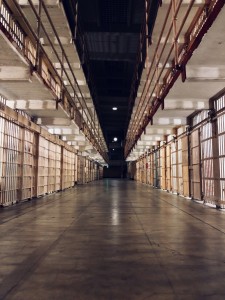 The Human Rights Defense Center (HRDC), recently discovered that New Hampshire’s Department of Corrections is rejecting books that are critical of the prison industrial complex. According to a report published by Book Riot, the DOC’s guidelines are aimed at removing access to books that pose a danger to the security of the prison, or books that contain obscene sexual content. But in practice, it seems that New Hampshire’s rejected books list includes texts like Prison Nation and The Factory, nonfiction books examining the prison system, as well as some How-To Draw books and popular works of fiction like The Lovely Bones and Cyptonomicon. New Hampshire is just one of many states exposed lately for infringing on the rights of prison inmates, but as states like Washington and New York can attest, public outcry over First Amendment rights is a powerful tools of defense.
The Human Rights Defense Center (HRDC), recently discovered that New Hampshire’s Department of Corrections is rejecting books that are critical of the prison industrial complex. According to a report published by Book Riot, the DOC’s guidelines are aimed at removing access to books that pose a danger to the security of the prison, or books that contain obscene sexual content. But in practice, it seems that New Hampshire’s rejected books list includes texts like Prison Nation and The Factory, nonfiction books examining the prison system, as well as some How-To Draw books and popular works of fiction like The Lovely Bones and Cyptonomicon. New Hampshire is just one of many states exposed lately for infringing on the rights of prison inmates, but as states like Washington and New York can attest, public outcry over First Amendment rights is a powerful tools of defense.
The list shows books like The Lovely Bones having been rejected for being “sexually explicit & offensive” which is just patently false. The Lovely Bones does have some graphic scenes, but it is routinely offered as a reading selection in High School, and readers of CommonSenseMedia.org put the approximate starting age for the book between 13 and 14 years old. As Book Riot points out,
It needs no repeating that access to books reduces recidivism, but equally as valuable is the right for those behind bars to have access to information about the very systems they’re experiencing. This is especially true as it becomes clearer and clearer that reasons for the banning of these books is inconsistent with already-existing policies or, worse, incorrect (see “white supremacy”).
What they mean by this is that if you search for the phrase “white supremacy” on the list, the only book that has that listed for the reason of its rejection is Prison Nation. Howard Zinn, respected author of A People’s History of the United States says says of Prison Nation is,
“An extraordinary collection of essays by some of our most astute observers of the American prison system. What they tell us is shocking and sobering, and their analysis forces to think beyond the cruelties of everyday prison life to the social forces behind those cruelties. This volume makes clear the connection between prisons and poverty, the class nature of the justice system. It is both a treasury of information and a profound examination of imprisonment in America.”
However just a cursory glance at the list reveals titles like The Lost White Race by Ira Calvin, which according to Amazon is a pro-segregation reprint of a book from 1944 that seems filled with overt dog-whistles to racist and hate-filled rhetoric. The reason listed for that book’s rejection is not white supremacy, it is “security threat groups.”
These kinds of discrepancies might not seem like much, but they demonstrate over and over throughout the list a lack of consistency in the reading, comprehension, and rationale behind the book banning process in New Hampshire. Removing texts that are critical of prisons is especially cruel in this situation, as it is one of the few ways that inmates can learn about and try to process the massive and flawed system they are trapped in and by denying them access to those, it is only perpetuating the recidivism loop that many get trapped in once they have been incarcerated.
Earlier this month, the ACLU wrote to the Arizona Department of Corrections and demanded they allow access to Chokehold, by Paul Butler, a former prosecutor turned author and advocate for the abolition of mass incarceration. Chokehold examines the racial disparities that exist in the criminal justice system, regardless of location or economic demographics. From the ACLU letter,
The very people who experience extreme racial disparity in incarceration cannot be prohibited from reading a book whose purpose is to examine and educate about that disparity. Improving understanding of policing, incarceration, and racial bias is especially critical given Arizona’s stark racial disparities and overall high rates of incarceration.
The same is true for Prison Nation and The Factory a memoir exploring the school to jail pipeline from an inside perspective. Denying access to books about problems with criminal justice system to the people in prisons is insane, trust that they already know there are problems. And these texts identifying what’s broken in the prison system aren’t going to cause people to riot, even if every inmate read them and understood how terribly flawed the system is. Reading doesn’t cause riots, it develops empathy, critical thinking skills, patience, and so many more positive skills. That is why it is universally agreed that education and reading lead to reduced rates of recidivism. And if we are still saying that prisons are a place for rehabilitation and redemption, then reducing the number of people who return, and therefore must be the top priority.
Check out the original Book Riot article to find resources they collected to help people speak out against this kind of First Amendments violation.
Check out CBLDF’s list of places where you can donate books and comics directly to inmates.